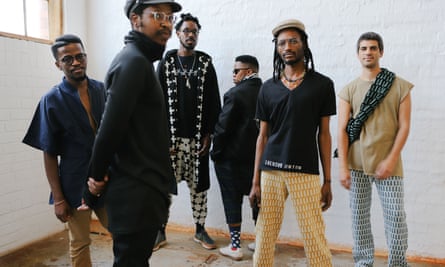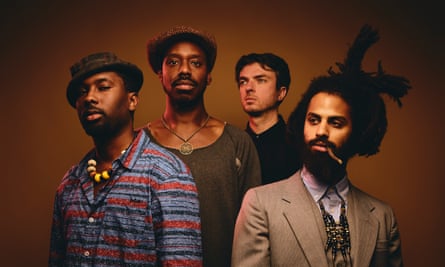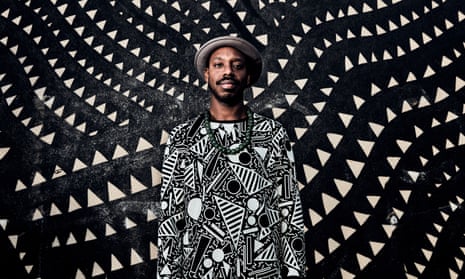Shabaka Hutchings has been thinking about the end a lot. “For there to be a change, there needs to be the end of what we want changed,” he says, oracle-like, sipping a black coffee. “You’ve got groups like Extinction Rebellion telling us that if we don’t radically change we will see the end of humanity. So how can we create something new to begin again?”
Wearing all black and well over 6ft tall, the saxophonist tends to speak softly in swirling allusions, a stream of consciousness referencing esoteric academics such as Kathryn Yusoff or Achille Mbembe. Yet, most will know him from his fiercely physical and resolutely unacademic onstage presence as a member of the bands Sons of Kemet (whose Mercury-nominated 2018 album Your Queen Is a Reptile was described by Pitchfork as “exhilarating and highly original”), the Comet Is Coming (their 2016 debut also received a Mercury nod), or Shabaka and the Ancestors. From the bookish to the sweatingly intense, the gap between the onstage and off is bridged by Hutchings’s singular focus: to effect change through the power of his music.

On Your Queen Is a Reptile, for instance, Hutchings named each track after “alternative queens” – women of colour such as Angela Davis and Doreen Lawrence – whom he feels history has largely overlooked in favour of the artificial hierarchy of the monarchy. Conversely, his psychedelic Comet Is Coming project combines the enveloping synths of keys player Dan Leavers (AKA Danalogue the Conqueror) and Hutchings’s own circular breathing, which allows for continual sound. There is no space for explanation here, only the force of feeling.
Since Hutchings emerged on the British jazz scene in the early 2010s, the audience for the genre has changed immeasurably. Spearheaded by acts trained by grassroots organisations such as London’s Tomorrow’s Warriors, rather than at fee-paying conservatoires, this new set of artists, the likes of drummer Moses Boyd and keys player Joe Armon-Jones, have enticed a younger audience, with improvised music that takes in the multicultural influences of their diverse heritage as much as swing tradition. Anointed by the Mercury nominations – accompanied by a coruscating broadcast performance in 2018 – Hutchings has become something of a figurehead for this next generation, a pensive mentor who has played his way through obscurity to festival main stages with the likes of Kendrick Lamar collaborator Kamasi Washington. He is now putting on his own lineup at the Barbican in May.
But the 35-year-old’s mind is currently occupied with how our society is reaching a breaking point. On the morning we meet at a bar in north London, there has been news of another deportation of a planeful of Jamaican immigrants, despite a successful legal appeal against the Home Office and the aftermath of 2018’s Windrush scandal. It feels particularly close to home for Hutchings, who grew up in London and Birmingham before moving to Barbados from the ages of six to 16.

“These deportations have been happening for a long time,” he says. “Ever since I was in Barbados I remember so-called ‘criminals’ arriving – it was like seeing the Caribbean as a dumping ground. It’s such a closed-minded, colonial mentality still, and it sends the message that what it means to be British is defined by the confines of this island. If you’re from elsewhere, you should leave. And if that’s your understanding then I think a lot of people in this country will feel really uncomfortable saying they’re British.”
Does he feel uneasy saying he’s British? “I say it all the time,” he laughs, “since I travel a lot in places where to not be British means to be just a black dude. To say I am British in the face of a border security guard means they won’t fuck with you as much. But it is also a term that has come to characterise classist hierarchies and self-destructive national pride. So it is not always an easy thing to say.”
Despite his musings on “the end”, Hutchings spends much of our conversation smiling and laughing. He sees himself as an optimist. “I feel really positive about the future,” he says, “because there is always a fraught tension before things change – things really do have to get worse before they get better.” In many ways, Hutchings’s latest release with his South African group the Ancestors, We Are Sent Here By History, acts as a roadmap for these necessary changes.
Conceived as a “sonic poem” of Hutchings’s music set to the lyrics of the Johannesburg-based performance artist and poet Siyabonga Mthembu, it covers everything from redefining masculinity to our relationship with the Earth. The record is an unapologetic call to action, with track titles such as They Who Must Die, You’ve Been Called and Behold, the Deceiver buffeting the listener like Hutchings’s breathless playing. Unlike the gospel-referencing intensity of his American peers, Hutchings’s music is visceral in its relentless rhythm, using two drummers in Sons of Kemet to almost replicate the energy of a club dancefloor, while still imbuing it with the unpredictability of jazz.
Masculinity is a particular reference point for the album. “I grew up with just my mum, and both me and her are only children, so there weren’t many examples of what it is to be a man – you just got on with it,” he says. “But when you look at our obsessions with class and national identity recently, so much of it is linked back to a crisis in masculinity; to the fact that boys aren’t told to be vulnerable or don’t really have any role models to learn from. So in the music and lyrics, I’m asking what it might look like if we did have that frame of reference.” This gets its fullest expression on the track We Will Work (On Redefining Manhood) – a concatenation of competing flute and percussion, sat beneath Mthembu’s zulu lyrics, calling to the listener that “a man doesn’t cry/a man doesn’t grieve” and ultimately resolving in a hopeful final movement that “we will work/on manhood”.
Hutchings’s political beliefs come to the fore in his energetic live shows. During a 2019 Sons of Kemet gig at London’s Somerset House, they projected slogans while whipping the crowd into a frenzy with polyrhythms and percussive melody. “One of my favourite moments in that gig was that I waited until a big drop in one tune and as soon as it came and everyone put their hands in the air, I triggered [a projection of] Boris Johnson’s quote of “Cheering crowds of flag-waving piccaninnies”. At that moment, when everyone was so euphoric, I wanted them to relate to how others in crowds have been seen while being euphoric; how their experience can be co-opted and used against them.”
It was a subtle but typically subversive move, one that rippled through the crowd to provoke a movement from joy to confusion to discomfort. “The music allows you to get people to a point of intensity, and in those moments they are engrossed and sensitive. If you can suggest something to them then, it is deeply powerful.”
Ultimately, Hutchings’s work is a conduit for these challenging messages. “It’s the initial flame that causes the burning,” he says – a Trojan horse to awaken listeners from their complacency. “We’re at a crisis point, and the only way we can continue is to have more discussions and to learn the perspectives of others,” he says. “People think that history is finite, but it is something that needs to be explored constantly; it needs to be challenged and sometimes set alight, so we don’t continue to make the same mistakes.”
Otherwise, the end may come too soon.
We Are Sent Here By History is out on Friday 13 March. Shabaka and the Ancestors tour the UK in May

Comments (…)
Sign in or create your Guardian account to join the discussion